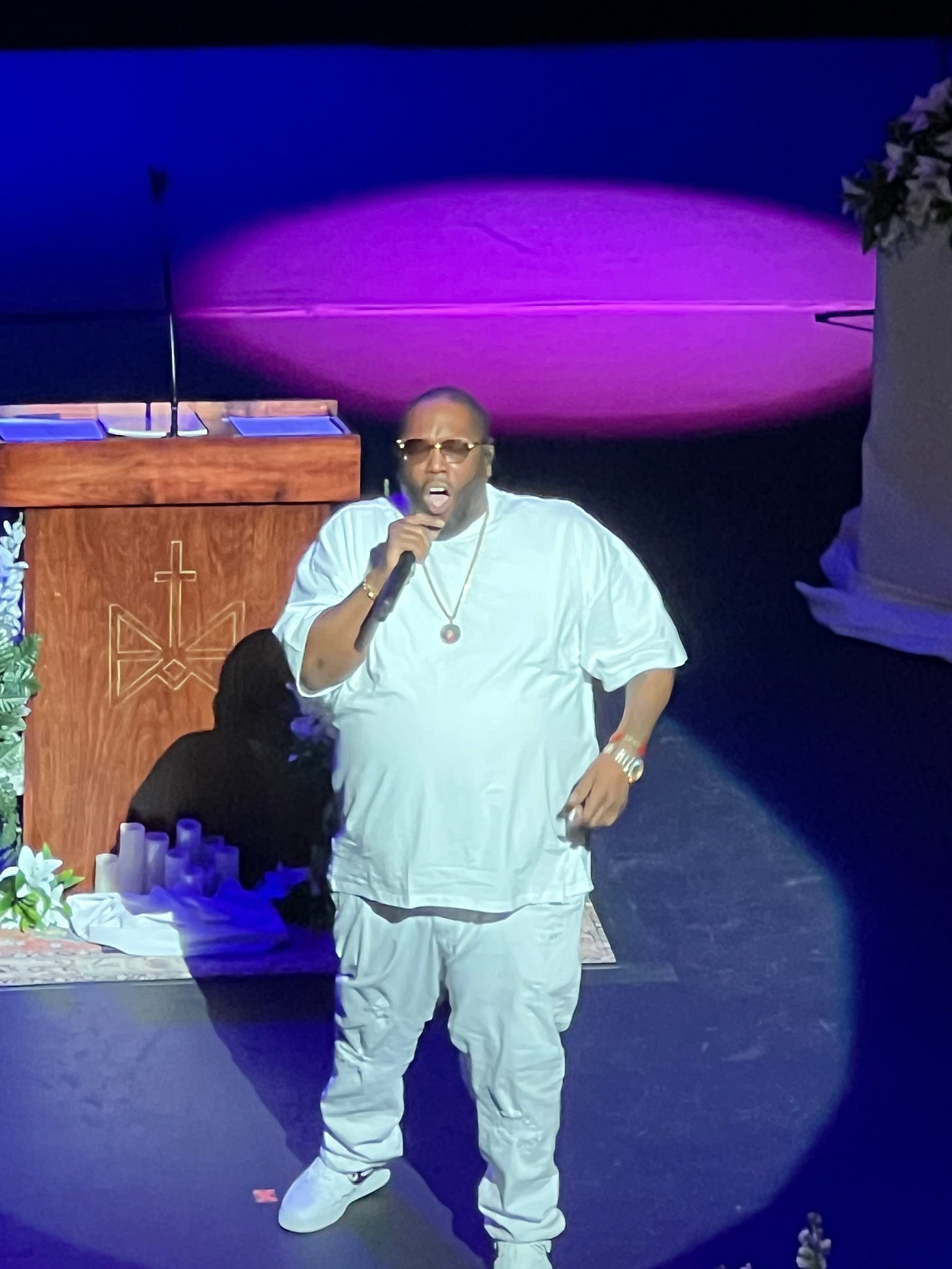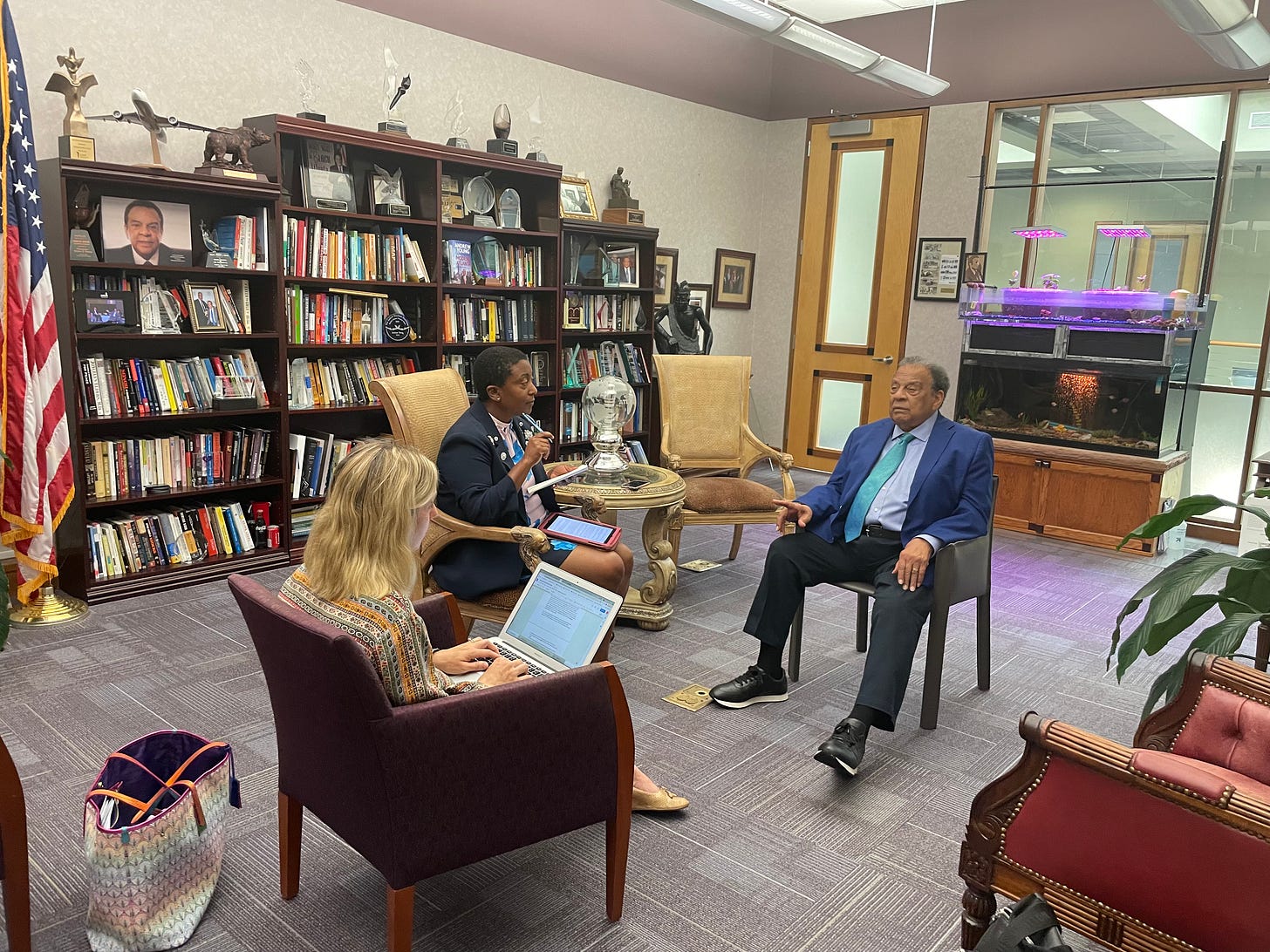Meet Michael Render, Andrew Young, Ryan Glover
Our book has exclusive insights into the lives & families of Render(rapper Killer Mike), Young(a Civil Rights leader) & Glover(an entertainment executive). Plus read here about our audio book narrator
Last year, we saw Michael Render in concert performing his solo album “Michael,” which would end up being honored by three Grammys. That’s him below at the historic Apollo Theater in Harlem. It was meaningful seeing Michael in person because we had spent years examining records from his life and talking with him and his family members about their family history.
We call him Michael, not Mike or Killer Mike, because he asked us to. Whether or not you’ve heard of him from the world of rap music or the world of politics (he sometimes campaigns for liberal candidates), you are bound to be intrigued by Michael’s family story in our book … as well as by Michael’s own financial setbacks, which our book is the first to chronicle.
Andrew Young has long been a mentor for Michael Render, and he paid for Michael’s first year of college. Andrew, as you likely know, is a Civil Rights leader who went on to serve in Congress, to represent the U.S. to the United Nations and to be Atlanta’s mayor. Through his family, we illustrate the impact of insurance and banking practices in the late 1800s. And through his life, we explore the debate over the role of capitalism and Civil Rights in the second half of the 1900s. You’ll also meet Andrew’s son, Bo, and learn about Bo’s views on the role of white and Black capital. By the end of our book, you’ll read Andrew’s candid, late-in-life predictions of what will happen with the Black-white wealth gap.
Ryan Glover traces his roots back to Oklahoma. Through Ryan’s family, we bring you the story of how Black Americans ended up in Oklahoma in the late 1800s with large land grants, some containing oil, and with the money to build the business district known as Black Wall Street. That district, the Greenwood district, was ultimately destroyed by a white mob.
In a reference to the Greenwood district, Ryan named the company he co-founded: Greenwood Bank. Ryan set up Greenwood Bank in 2020 during the racial reckoning. His co-founders were Michael Render and Andrew Young.
When a former entertainment executive (Ryan) starts a company with a rapper (Michael) and a Civil Rights leader (Andrew), interesting things happen. In addition to profiling these individuals, we followed Greenwood Bank’s trajectory in our book. It provides a case study on Black-owned businesses and the challenges they face. One of the company’s customers is a woman we featured in this newsletter before, Tandreia Dixon. (Past issue about her here.)
We won’t spoil the book for you —the stories of these people kept us moving in our reporting and will keep you moving in your reading. Or in your listening.
What’s In a Name? What’s In a Voice?
This is Tovah Ott. She narrates our audio book, and we wanted to share our spotlight with her. This is a condensed version of a conversation Louise had with Tovah.
Louise: Thank you for reading our book. How did you find it?
Tovah: It was hard. I mean, I live in this country. I knew a lot of stuff. There were some things that I didn't know. I have one particular close friend. He's half Thai, half Black. He and I have some pretty good discussions. And there are a couple of things I was like, '“did you know this? Did you know that?” And he was like, “what? No.” And so then he would go research, and he was like, “oh my God.” We really were able to deep dive into some things that we just didn't know.
Louise: I know you were recording the audio for our book amid everything else in your life. Did you see connections between the book and your life?
Tovah: I have five children. My oldest is graduating high school, my youngest 11. So we're at this point where we're really trying to navigate things with them, and we have four boys. So it's a lot of, “okay, you guys, this is how you have to handle yourself. This is how you will come across. This is what we want to prepare you for.”
Especially when it comes to like, finances. My oldest going through the whole college loan situation, and I’m not wanting him to get into the same sort of things that I had to get into [with loans]. There's certain things that I want to be able to give to my children. So it was very interesting reading this, and it just really kind of helped navigate where we're at. My son is going to school, and so while California is amazing in certain aspects, room and board here is expensive, and how do we know when to say “no?” How do we know when to say, “we’re setting you up for the future.” Being able to give him specifics as to “why” helped form those conversations.
Louise: You mentioned you took on student loans. What else would you like to share about your upbringing and your education?
Tovah: My mom had my sister really young, like 15 or 16. She had me around 22. I moved with my mom to California then back to Ohio with my grandmother. Then my sister started having kids at 16, and my grandmother was like '“no, I need to take you out of this.” So I moved back to California with my mom.
Louise: Given the topic of our book, can you share your racial identify with our readers?
Tovah: I’m African American. I did not grow up with my father’s side, but he was Black. His parents might be mixed with something, I’m not sure. But the world refers to them as Black. I just always say I’m Black.
Louise: Can you tell me about your name?
Tovah: My grandmother, one of the things she always did was watch AMC, the movie channel. She loved old movies. And when my mother was pregnant, she was watching a movie, and the actress’s name in the credits was Tovah. Tovah Feldshuh. And she was like “oh, I love that name, we’re gonna name her that.”
What you realize in this country is it’s a Jewish name, right? I used to work in retail and people would go, “are you Jewish or what’s going on?” And I’m like “no, she got my name from an actress. She thought it was a beautiful name.”
Louise: I know you have narrated many books. Beyond romance books — which you narrate under a different names — several have been by Black female authors.
Tovah: I will get reviews that say, “why did you have this white woman narrate this book?” And I’m like “I’m not white.” But, I also understand they can’t see me. My voice isn’t always indicative of certain experiences. Even people in those experiences don’t necessarily sound like you think.
Thank for reading — or listening to — our book. For those of you who pre-ordered, the book should be in your mailbox — or in your Audible library — on the release date, this Tuesday June 18.
We look forward to hearing from you as you read the book. We invite you to write to us by replying to this e-mail.
-Louise and Ebony





